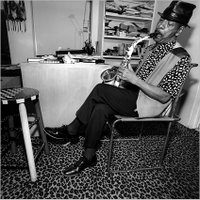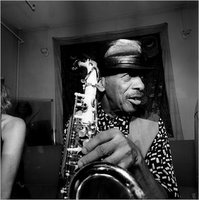Sound grammar in a universal language

“ The system works in a cyclical way. Because you’re thinking in odd numbers instead of even numbers, you’re playing with a different value system. Popular music is usually based on the number 2 and then filled in with fabrics, colors, effects and technical wizardry to make a point. But the total effect is usually depressing and oppressive and a dead end which at the most can only last in a nostalgic way. If you’re using an odd numerical system, things that strengthen a performance automatically begin to happen and make it memorable for the ages…A song executes itself on several fronts and you can ignore musical customs."
I was reminded of this after reading a recent New York Times article by Ben Ratliff on the legendary and elusive jazz artist Ornette Coleman. Credited with inventing the style called "free jazz", Coleman now 76, has released "Sound Grammar" -- his first recording in over a decade.
Writing in the Socialist Review on the occasion of Coleman's 75th birthday, Peter Segal notes that "Ornette Coleman has changed the way we listen to music. He spearheaded the idea of improvisation without chord changes, while retaining the rhymic impetus - the swing - of jazz. By changing the way we listen to music and redefining ideas about collective improvisation, his radicalism divided his listeners into either staunch enthusiasts or those who decried him as a fraud."
Coleman admits that "Standard Western (music) notation is a big problem for him, particularly for the fact that the notation for many instruments ...must be transposed to fit the 'concert key' of C in Western music." He says he does not understand "how the listener will ever understand the power of notes when they are bossed around by the common Western system of harmony and tuning." (GW).
Seeking the mystical inside the music
By Ben Ratliff
New York Times
In any case, other people’s music was what I wanted to talk to him about. I asked what he would like to listen to. “Anything you want,” he said in his fluty Southern voice. “There is no bad music, only bad performances.” He finally offered a few suggestions. The music he likes is simply defined: anything that can’t be summed up in a common term. Any music that is not created as part of a style. “The state of surviving in music is more like ‘what music are you playing,’ ” he said. “But music isn’t a style, it’s an idea. The idea of music, without it being a style — I don’t hear that much anymore.”
Then he went up a level. “I would like to have the same concept of ideas as how people believe in God,” he said. “To me, an idea doesn’t have any master.”
Mr. Coleman was born, in 1930, and raised in Fort Worth, where he attained some skill at playing rhythm and blues in bars, like any decent saxophonist, and some more skill at playing bebop, which was rarer. He arrived in New York in 1959, via Los Angeles, with an original, logical sense of melody and an idea of playing with no preconceived chord changes. Yet his music bore a tight sense of knowing itself, of natural form, and the records he made for Atlantic with his various quartets, from 1959 to 1961, are almost unreasonably beautiful.
Following that initial shock of the new came a short period with a trio, then a two-year hiatus from recording in 1963 and 1964, then the trio again, then a fantastic quartet from 1968 to 1972 with the tenor saxophonist Dewey Redman (who died three weeks ago), then a period of funk-through-the-looking-glass with his electric band, Prime Time. Mr. Coleman is still moving, now with a band including two bassists, Greg Cohen and Tony Falanga, and his son, Denardo Coleman, on drums.
He has a kind of high-end generosity; he said that he wouldn’t think twice about letting me go home with a piece of music he had just written, because he would be interested in what I might make of it. But there is a great pessimism in his talk, too. He said he believes that most of human history has been wasted on building increasingly complicated class structures. “Life is already complete,” he said. “You can’t learn what life is. And the only way you die is if something kills you. So if life and death are already understood, what are we doing?”
A week later we met for several hours at his large, minimal-modernist loft in Manhattan’s garment district. Mr. Coleman is 76 and working often: he is making music with his new quartet that, at heart, is similar to what he made when he was 30. On “Sound Grammar,” his new live album (on his new record label, of the same name), it is a matter of lines traveling together and pulling apart, following the curve of his melodies, tangling and playing in a unison that allows for discrepancies between individual sound and intonation and, sometimes, key.
Unison is one of his key words: he puts an almost mystical significance in it, and he uses it in many ways. “Being a human, you’re required to be in unison: upright,” he said.
Mr. Coleman draws you into the chicken-and-egg questions that he’s asking himself. These questions can become sort of the dark side of Bible class. Many of them are about what happens when you put a name on something, or when you learn some codified knowledge.
Though he is fascinated by music theory, he is suspicious of any construct of thought. Standard Western notation and harmony is a big problem for him, particularly for the fact that the notation for many instruments (including his three instruments — alto saxophone, trumpet and violin) must be transposed to fit the “concert key” of C in Western music.
Mr. Coleman talks about “music” with care and accuracy, but about “sound” with love. He doesn’t understand, he says, how listeners will ever properly understand the power of notes when they are bossed around by the common Western system of harmony and tuning.
He’s not endorsing cacophony: he says making music is a matter of finding euphonious resolutions between different players. (And much of his music keeps referring to, if not actually staying in, a major key.) But the reason he appreciates Louis Armstrong, for example, is that he sees Armstrong as someone who improvised in a realm beyond his own knowledge. “I never heard him play a straight chord in root position for his idea,” he said. “And when he played a high note, it was the finale. It wasn’t just because it was high. In some way, he was telling stories more than improvising.”
Click here to read more of the New York Times article.
Click here to read Peter Segal's 2005 article in Socialist Review.


0 Comments:
Post a Comment
<< Home